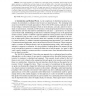Free Online Productivity Tools
i2Speak
i2Symbol
i2OCR
iTex2Img
iWeb2Print
iWeb2Shot
i2Type
iPdf2Split
iPdf2Merge
i2Bopomofo
i2Arabic
i2Style
i2Image
i2PDF
iLatex2Rtf
Sci2ools
121
click to vote
ISPE
2003
2003
Coordination in utility managed multi-agent groups
A two stage approach to co-ordination in a multi-agent society is presented. The first stage involves agents learning to co-ordinate their activities based on local and global utility – the latter being assigned by an Environment Service Node. Each agent aims to maximise its local utility over a single-step or finite horizon, subject to reinforcements being received from the ESN. An agent may reveal all or partial state to the ESN, and does so through specialised function operators. Groups are formed by agents trying to identify partners which enable them to achieve a higher local utility. Subsequent interactions with the group are structured and managed via GroupLog – an approach for supporting interactions between agents within a community. An example based on resource sharing within a Computational Grid is used to illustrate how the two approaches may be combined. Key words. Multi-agent systems, co-ordination, group models, computational grids.
Distributed And Parallel Computing | Environment Service Node | ISPE 2003 | Local Utility | Stage Involves Agents |
| Added | 31 Oct 2010 |
| Updated | 31 Oct 2010 |
| Type | Conference |
| Year | 2003 |
| Where | ISPE |
| Authors | Fernanda Barbosa, José C. Cunha, Omer F. Rana, Steven J. Lynden |
Comments (0)

